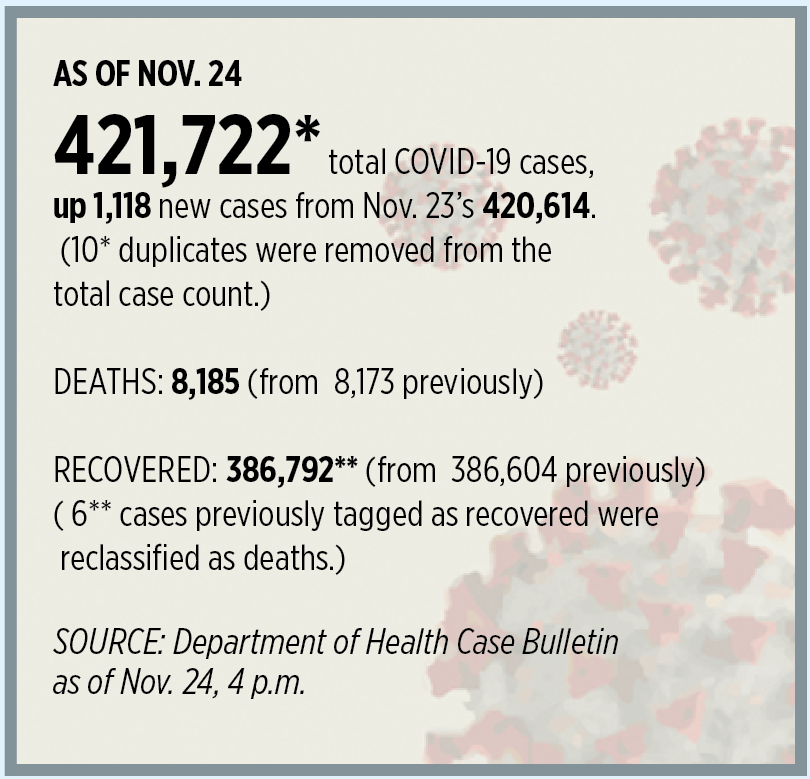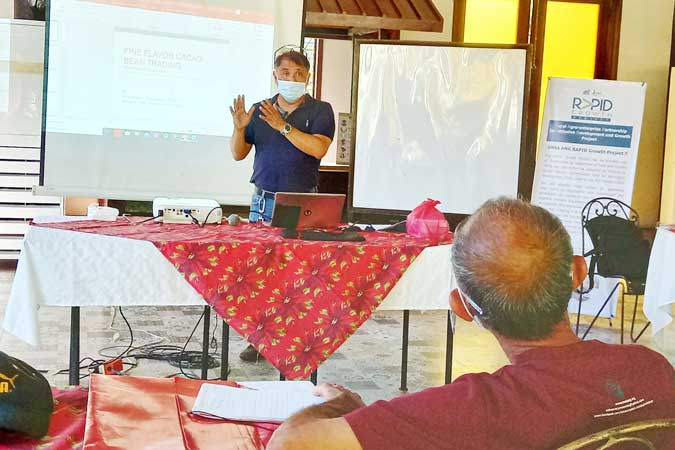Nationwide round-up (11/24/20)
Senator pushes for probe into PITC’s P33-B ‘parked’ funds
A SENATOR on Tuesday pushed for an inquiry into the operation of the Philippine International Trading Corp. (PITC) amid allegations of some P33.4 billion in “parked” funds. “It appears like government agencies are using PITC to skirt the end-of-the-year validity of appropriations,” Senate Minority Leader Franklin M. Drilon said in his privilege speech during Tuesday’s session. “PITC is being used as a pawn. PITC effectively provides a mechanism to hide inefficiencies in government.” Mr. Drilon said government agencies deposit unobligated and undisbursed funds in PITC, instead of reverting the money to the National Treasury. He also cited the Commission on Audit reports indicating that PITC received millions worth of service fees from 2016 to 2019. “We should likewise ask: what percentage of this service fee is being remitted to the national coffers?” he said. Finance Secretary Carlos G. Dominguez III had announced that some P20 billion worth of loan will be extended by the Land Bank of the Philippines and the Development Bank of the Philippines to the PITC for the procurement of vaccines. Mr. Drilon said the government should reconsider borrowing for the procurement of coronavirus disease 2019 (COVID-19) vaccines and instead compel the PITC to return the P33.4 billion. — Charmaine A. Tadalan
VP Robredo asks Supreme Court to dismiss Marcos electoral protest
VICE President Maria Leonor G. Robredo’s lawyers asked the Supreme Court to dismiss the electoral protest of losing bet Ferdinand R. Marcos, Jr. given the widening of her lead after the recount in the three pilot provinces where fraud allegedly occurred. In a comment filed before the high court sitting as the Presidential Electoral Tribunal, the lawyers asked for an affirmation of the result of the recount of ballots in the pilot provinces of Camariñes Sur, Negros Oriental, and Iloilo. They said the election protest should be dismissed citing Rule 65 of the 2010 Presidential Electoral Tribunal Rules, which provides that a case should be dismissed if a protestant failed to make out his case. Under the rule, a protestant is allowed to choose three provinces that show massive fraud and will be used as “test cases” by which the tribunal will decide if they would proceed with the protest. Ms. Robredo also said that the Commission on Elections (Comelec) gave this same position in its compliance filed early this month. “For four years, protestant Marcos was afforded the opportunity to substantiate his allegations of massive electoral frauds, anomalies, and irregularities,” the lawsuit read, “However, aside from these statements to the media, protestant Marcos has not presented an iota of evidence to substantiate his claims of fraud.” The lawyers also said that Mr. Marcos misled the tribunal and that there is no merit in the allegation that there was election fraud in the Comelec-Election Record and Statistics Division’s Voters Identification Division. The vice president’s motion cited the compliance of the poll body saying that the report relied upon by Mr. Marcos “has no probative value.” “Thus, applying the strictest standards and procedure of law,” the results of the revision, recount and re-appreciation of the ballots from the three pilot provinces rendered moot the issue of Annulment of Elections in the Provinces of Lanao del Sur, Maguindanao, and Basilan,” it said. Mr. Marcos filed the protest in June 2016 after narrowly losing to Ms. Robredo. A resolution released in October 2019 showed that Ms. Robredo’s lead against Mr. Marcos in the pilot provinces of Camariñes Sur, Iloilo, and Negros Oriental rose by around 15,000 votes after initial recount. — Vann Marlo M. Villegas
Prosecutor in Palparan, Korean businessman cases passes away
SENIOR Assistant State Prosecutor Juan Pedro “JP” C. Navera died on Tuesday at the age of 49, the Department of Justice (DoJ) confirmed. “The whole DoJ family mourns his death. It was a great loss to us. He was one of our best,” Justice Secretary Menardo I. Guevarra said in a text message. Mr. Navera led the prosecution of retired Army general Jovito S. Palparan, Jr. and two other military officers over the abduction and illegal detention of student activists who went missing in 2006. The three were convicted in 2018 and sentenced to reclusion perpetua or 20-40 years of imprisonment. He also led the case on South Korean businessman Jee Ick Joo who was killed by police in 2016, among other cases. Mr. Navera “was at once an embodiment of a principled, fair, no-nonsense, brilliant and diligent lawyer. He was a quintessential professional,” the National Union of Peoples’ Lawyers (NUPL) said in a statement. The NUPL were the private prosecutors in the case against Palparan. The group said they were “awed at how he shattered Gen. Palparan’s testimony to smithereens on cross.” They also said, “While we have very minor differences in tactics, he respected us and cooperated with us as co-equals in a very productive collaboration.” — Vann Marlo M. Villegas
Over 2,500 activists illegally arrested — BAYAN
MORE than 2,500 activists have been illegally arrested over “questionable grounds,” Bagong Alyansang Makabayan (BAYAN) spokesperson Teodoro A. Casiño said during the Senate’s continuing hearing on red-tagging. “2,596 have been illegally arrested and 973 arrested and detained, many on questionable grounds, with the arresting police or military unit routinely planting evidence to make it appear that they are armed combatants,” Mr. Casiño said on Tuesday. This includes 57 from BAYAN, Kilusang Mayo Uno, Gabriela and National Federation of Sugar Workers in Bacolod City. Mr. Casiño was also representing Gabriela, Kilusang Mayo Uno, Anakbayan League of Filipino Students, and the Alliance of Concerned Teachers before the Senate committee looking into the alleged links of opposition political parties to armed communist groups. Opposition lawmakers skipped the panel’s first hearing on Nov. 3, which was attended by security officials. Mr. Casiño also denied accusations made by former rebel Jeffrey Celiz that he is a member of the Communist Party of the Philippines (CPP) and that BAYAN, among other political organizations, serves as a front organization for the CPP-New People’s Army-National Democratic Front. “My accusers have failed to provide any document, any incident, or any piece of competent, admissible and credible evidence to prove their allegations against me,” he said. — Charmaine A. Tadalan


